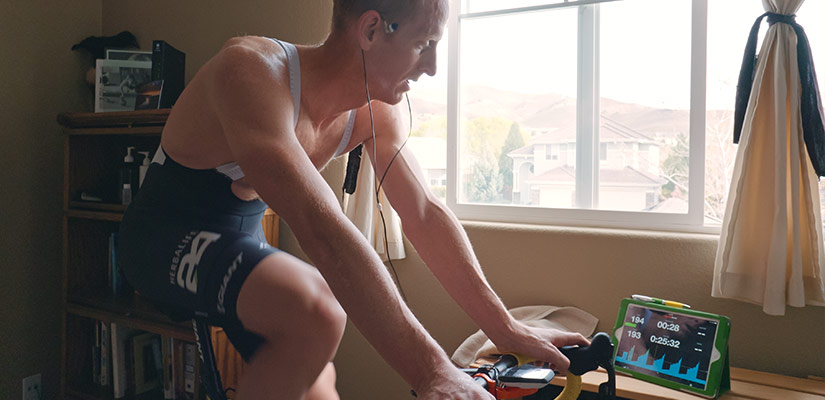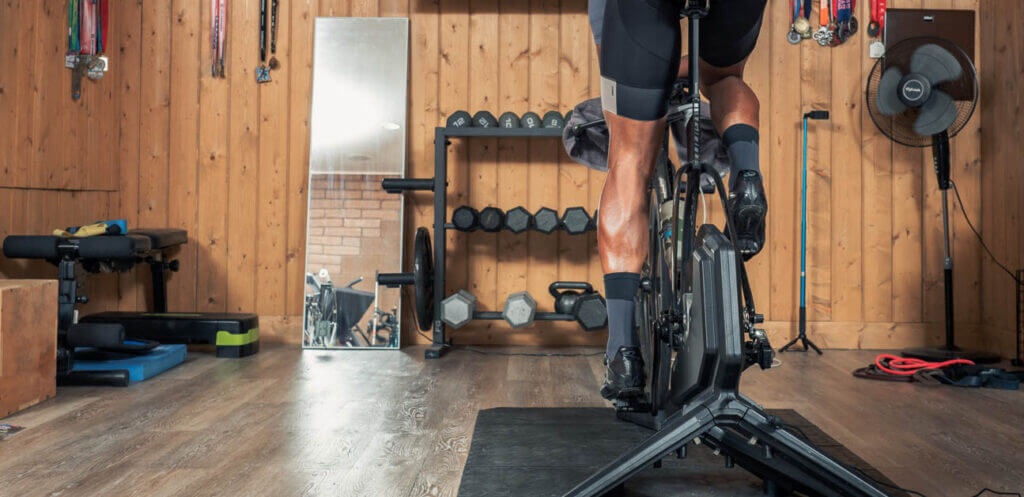How to Stay Motivated to Train Indoors

There’s no question training indoors is the most effective way to train. Zero distractions mean you’re able to focus on specific skills and nail your intervals with precision. But, despite how effective indoor training may be, the transition that happens predominately before winter from outdoor to indoor training can be a challenge at times. To help make the adjustment easier, here are five solid tips for staying motivated to train indoors.
#1: Set goals, have a plan, review often.
Goals are critical. Before you get on your trainer to workout, your mindset is everything. If it’s absent of goal-oriented thoughts, you put yourself at a disadvantage. All serious cyclists and athletes know this.
When you think about what your goals are, you become inspired. But not only that, you become prepared. This is key. Getting mentally prepared is the toughest part of overcoming a lack of motivation. When your mindset is right, everything is easier to do.
Here’s something else that’s key. While it’s good to know the “why” part of training, knowing the “how” is even more important. Just because your goal might be to complete your first Ironman, that goal means nothing without a plan for achieving it.
This is one of the reasons structured training plans are so effective. The exact steps you must take to reach all your cycling goals are laid out in perfect order. This gives riders extreme clarity. Clarity is a powerful asset, as it helps to squash any lack of inspiration you could have during your training by keeping you laser focused on your goals.
#2: Reduce decision fatigue.
Decision fatigue is an unsuspecting reason athletes can suffer at times from a lack of motivation to train. It’s the widely studied idea that the act of making decisions, no matter how simple, weakens a person’s willpower. The more decisions you have to make throughout the day, the more at risk you are of making poor choices. Like say, skipping a workout or making the wrong kind of adjustments during it.
To reduce the effects decision fatigue can have during training, structure your life to conserve willpower. There are many ways to do this. Here are just two tips to take into consideration:
First, make commitments — not decisions. Saying you’re going to work out on your trainer tomorrow is a lot different than having your training schedule in your Google calendar, with notifications going off at 7:00am on Tuesdays, Thursdays and Sundays. Make things easy. Decide once the times you can commit yourself to working out. Doing this will improve training consistency and take up less of your mental energy each day.
Second, make tomorrow’s decisions today. What do you need to eat to feel good during your workout? What do you need to wear in order to recover afterwards? What tools or devices should you have on hand? All that goes into getting ready for your indoor workout, think through the day before.
#3: Create an inspiring and comfortable environment to ride.
The place you do your indoor workouts should be two things: inspiring and comfortable. You’ll spend several hours a week there so why not make your personal pain cave as awesome as it can be?
I’ve mentioned this before, but I prefer a dedicated, tidy, dimly lit area with a brightness that borders on mood lighting. That’s how I like things when I’m putting in my hours on the trainer. There are other athletes, like Justin Rossi for example, who find the opposite inspiring. Rossi prefers his trainer on the carpet, beside an open window and his two French Bulldogs close by.
The lesson here: Discover the setup that energizes you and create it.
Regarding the comfort factor of your indoor training environment, there’s really only one thing you need: a good fan. Place it at the base of your bike and aim it at your body, or put it front in center on its high setting and you’re good to go. If you want to take things up a notch, buy an appliance to control the ambient temperature of where you workout. In this case, a portable swamp cooler or air conditioner will do just the trick.
#4: Use entertainment to combat possible boredom.
Indoor training has long been typecast as boring. This is changing. Especially in the last several years as new tools have made it to market. Now, more than ever, your indoor riding experience is what you make it. This translates to boredom no longer being a strong excuse for dismissing indoor training.
Whatever entertainment you love, you can have it right there as you ride. Use this to your advantage as you work up the motivation to train. Think of your favorite show or movie. Then think about how good it would feel to watch it while getting a killer structured workout in. How? TrainerRoad’s one way. Our workout software allows you to use all your favorite entertainment platforms including Netflix, Hulu, YouTube, iTunes and more.
#5: Use your favorite devices to stay on track with your training.
Technology should help you achieve your training goals — not keep you from them. That said, if you want to invest in an indoor training software, consider your devices beforehand. Ask yourself, “What are the devices I use most often and do the training tools I want to invest in support them?”
It’s best if your indoor training software and workout videos have multi-device compatibility. This helps make your life a little easier and gives you a plan B if you ever need it. Life throws a lot of curveballs. Sometimes your daughter needs your laptop to do her homework assignment, even though it’s your schedule time to train. Sometimes said laptop can burn up in a big ball of smoke unexpectedly. When curveballs happen, it’s nice to have a no-fuss backup plan, like switching to another device, to help keep you motivated and your training on track.
Conclusion
You already know the reasons indoor training is more effective than outdoor training. Hopefully today’s post shined some light on why it doesn’t have to be viewed as more challenging.
Riders, what are your tips for staying motivated to train indoors? Feel free to share them with me in the comment section below.
A version of this post originally appeared on Triathlete.com.

